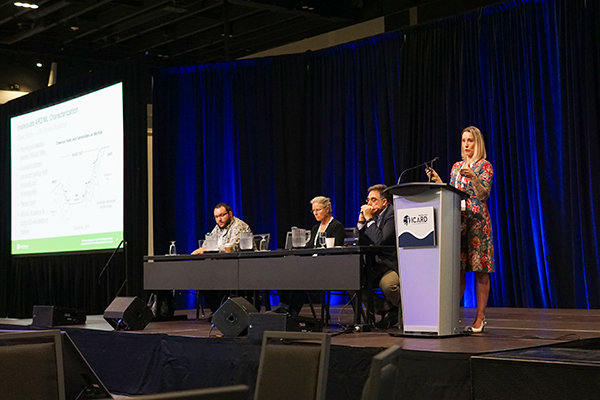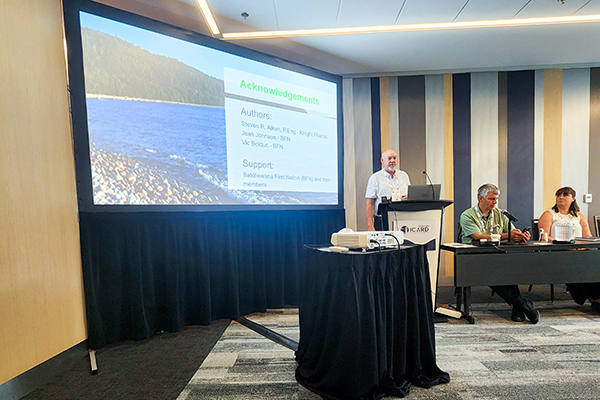

Knight Piésold Canada Specialists Address ARD/ML Challenges at ICARD 2024
October 9, 2024, North Bay, ON, Canada – Two geochemistry specialists from Knight Piésold Canada presented at the 13th International Conference on Acid Rock Drainage (ICARD 2024), shedding light on critical aspects of acid rock drainage and metal leaching (ARD/ML) management in both mining and non-mining infrastructure contexts.
Importance of Indigenous Community Engagement for Mining Projects
Steven Aiken, the manager of environmental services at Knight Piésold's North Bay office, discussed the paper, “Importance of Indigenous Community Engagement related to ARD/ML and Long-Term Water Quality,” during the Indigenous and Mitigation Approaches session. Co-authored by Jean Johnson and Vic Bolduc of the Batchewana First Nation (BFN), the paper emphasizes the critical role of water in Indigenous communities.
"Water is the most significant and highly valued resource within BFN’s Territory,” Aiken stated. He underscored the necessity of engagement to ensure that mining companies understand the importance of water to Indigenous communities, both in the short term and across generations.
The BFN in northeastern Ontario has both historical and active mines and mineral exploration projects within their Traditional Territory, each with the potential to impact water quality through ARD/ML generation from these mining activities. The BFN has established standards that exceed government requirements and mining industry best practice.
Aiken highlighted how the ongoing dialogue between BFN and mining companies, from early exploration to post-closure, has not only improved water quality outcomes but also strengthened relationships between parties.

Effective ARD/ML Assessment for Non-Mining Infrastructure Projects
Amber Blackwell, a project geoscientist at Knight Piésold’s North Bay office, presented the paper, “Effective Assessment of ARD/ML Potential for Non-Mining Infrastructure Projects,” during the Prediction III session. Her talk shed light on an often-overlooked aspect of infrastructure development.
“The potential risks and impacts associated with ARD/ML are both less well-known and understood in the infrastructure space,” Blackwell explained. She reviewed several high-profile infrastructure projects that encountered unforeseen ARD/ML issues, emphasizing the importance of early and thorough ARD/ML assessment to mitigate risks.
She also discussed that while some ARD/ML assessment guidelines have been developed for use in the infrastructure industry, they are generally based on assessment frameworks from the mining industry. She stressed that several differences exist between these industries, such as the availability of baseline information, the complexity and understanding of geological settings, and the strictness of construction timelines. She described that the use of a phased and risk-based approach to ARD/ML characterization, as well as early stage interdisciplinary communication are crucial to effectively characterize the geochemical nature of materials from non-mining projects.
“Successful ARD/ML characterization prior to construction will minimize the potential environmental impacts and escalated project costs associated with unexpected ARD/ML and the subsequent treatment and remediation efforts,” she concluded.
About ICARD 2024
ICARD 2024, held from September 16 to 20 at the Halifax Convention Centre in Halifax, Nova Scotia, included over 140 presentations from international practitioners, sharing technical solutions for ARD/ML prediction and mitigation and discussing leading practice management strategies. The conference was organized by the Canadian Institute of Mining, Metallurgy and Petroleum (CIM), the International Network for Acid Prevention (INAP), and the Canadian Mine Environment Neutral Drainage (MEND) Program.
“ICARD 2024 offered an exceptional opportunity to showcase our proactive approaches to ARD/ML risk management in both mining and infrastructure sectors,” Aiken remarked. “As this field continues to evolve, we look forward to furthering conversations with ARD/ML practitioners in helping shape a more sustainable and responsible future for resource and infrastructure development worldwide.”